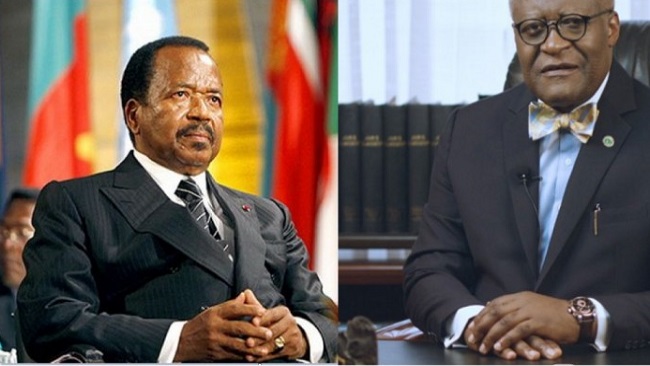October 7: The Challenges facing Biya and Akere Muna
The Nkafu Policy Institute, are pleased to release a scientific, nationwide opinion pollof adult Cameroonians on the state of the economy, perceptions on governance and the democratic process, and voter preferences for the 9 presidential candidates. This survey, conducted with the support of the National Endowment for Democracy, interviewed 2,024 adult Cameroonians in all ten regions.
Interviews were conducted in 54 urban centers and 25 rural localities from September 10 to September 20, 2018. All interviews were conducted before the official start of presidential campaigns. This representative sample has a margin of error of +/- 3%.
The findings reveal a country in free fall. 79.1 percent of Cameroonians believe the economy is headed in the wrong direction. The poverty level is alarming. Less than 17.65% percent of Cameroonian adults earn more than 200,000 FCFA (~$400) dollars a month. Cameroonians are mostly concerned about the state of infrastructure in the country: electricity, water, bridges, roads, railways and sea ports.
Today, 90 percent of Cameroonians believe the road infrastructure is bad or very bad. A large majority of Cameroonians (82.17 %) want local administrators such as Governors to be elected by the people.
Cameroonians have very little confidence in the legislature (only 16.31 % support the work done at the national assembly and 14.48 at the senate); supreme court (only 18.15 % of support), central government (16.93 % of support); constitutional council (16.40 % of support).
The vast majority of Cameroonians (65.04%) believe the Anglophone conflict is the greatest threat to the security of the country and most do not support the government’s war in the Northwest and Southwest regions.
Only 7.84 % percent of Cameroonians support the use of force while 85.49 % percent believe dialogue or negotiation should be the way forward. Not surprising, the incumbent president, Paul Biya, is deeply unpopular after 36 years in power, managing only 29.82%percent of support.
Three opposition candidates stand out with the young 38-year Cabral Libii among the group with 11.24 percent. The other top two candidates being Mr. Maurice Kamto(12.65 percent) of the Cameroon Renaissance Movement and Mr. Joshua Osih(13.10 percent) of the Social Democratic Front.
The top three candidates were all within the margin of error. Mr. Libii’s is mostly supported among Francophone youths where he commands 19.37 percent support among those less than 35 years old. The biggest surprise is the very poor showing from Mr. Akere Muna, with a support of only 2.12 percent.
It is very clear today that if Cameroon’s opposition parties are seriously interested in winning the single-round presidential elections scheduled for October 7, 2018, coalescing between Mr. Libii, Mr. Kamto and Mr. Osih, or only two of the three would greatly increase their chances.
One must be worried as 49.65 percent of Cameroonians are concerned of the risk of post-electoral violence.
This survey, in very simplistic terms, shows a society in deep decay, with no sense of direction and very little agreement on the most basic processes. There is great concern that at the current pace the growing tensions between communities and various political actors may degenerate into popular uprisings as societal norms continue to be eroded.
There is great need, in the lead up to this presidential election, for a stronger involvement of the international community. It would be deeply unfortunate should the October 7 presidential elections further plunge the country deeper in crises. Strong actions must be taken to avert this real possibility. There is great yearning for a new consensus among Cameroonians, for a new beginning.
Source: Nkafu Policy Institute





